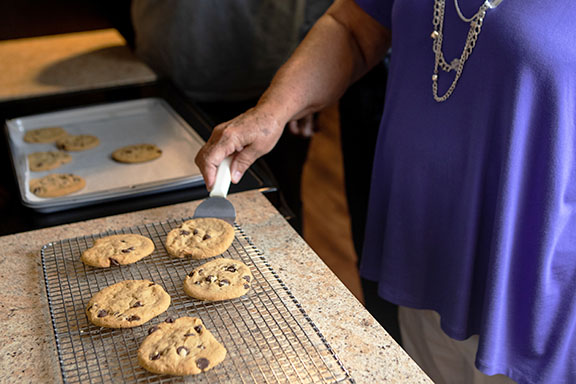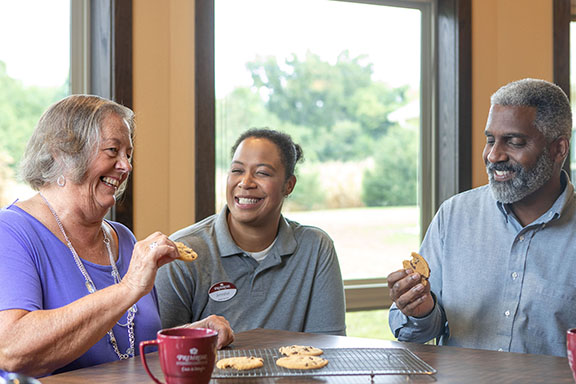What is it like living in a Silver Lace Memory Care neighborhood?
Silver Lace Memory Care by Primrose residents thrive in structured and predictable environments. By providing residents with as much consistency as possible within their day, we are providing them with greater confidence and a greater sense of security. Primrose Retirement Communities embrace the person-centered care approach to resident quality of life and are committed to applying it in a meaningful way to honor the preferences of our residents. Using procedural memory, the type of memory that relies on repeated experiences, our Silver Lace residents will learn, and adjust to consistently offered aspects of care.
Activities of Daily Living
As an aspect of Person-Centered Care, all things start with the residents’ preferences in mind, and this includes the start to their day. Residents are allowed to sleep until they are ready to get up, rather than be forced to get up, decreasing any struggles or moments of upset. Additionally, once awake, we continue to honor their preferences in areas such as maintaining Activities of Daily Living (ADL) habits (showers/baths in the morning or evening), clothing choice, breakfast habits (a cup of coffee, a continental breakfast, a large farm breakfast, etc.), and the order in which these morning traditions are offered to each resident.

While a full day of engaging programs has been developed, it would be a misunderstanding if we were to think that those are the only activities that we have to offer residents each day. Every interaction we have has the potential to be an enrichment opportunity. Even upon awakening and morning ADL assistance, we can turn these ‘tasks’ into a meaningful time between a care team member and resident.
For example, a care team member might be assisting a resident from their bed and into the bathroom. They know that the resident loves to sing, and it’s a sunny day. To help the resident greet the day in a positive way, the team member says, “This sunshine makes me think of the song, ‘You Are My Sunshine’, do you know it? Let’s sing it together!”
Such an interaction provides joy to both the resident and the team member and helps to strengthen the bond between them. We encourage these spontaneous enrichment opportunities, and even strive to turn them into care traditions that can be used every day if a resident truly enjoys it.
Daily Neighborhood Energy Levels
Many residents with memory care diagnoses will have trouble managing a healthy energy pattern throughout the day. Studies have shown that 50-70% of those living with dementia will experience apathy as part of their dementia experience. This means that they will lose the motivation to engage in things they would usually find meaningful or worthwhile. A significant number of people, on the other hand, will experience a spike of energy each afternoon/evening that may cause them to feel anxious, move about, or get stuck on a certain thought. Some residents may also confuse their day and night cycles, sleeping during the day and staying awake at night. Because of these energy challenges, setting a consistent and predictable energy sequence for the neighborhood will help many residents experience a more consistent pattern themselves.
Once residents are awake, have had breakfast, and are transitioning into the day, the neighborhood begins to take on an energetic feel, much like we experience in traditional daytime patterns in our American culture. Examples of setting an energetic feel in the neighborhood are:
- Active programs throughout the morning such as exercise, music, and outings.
- Happy, upbeat music being played in between formal group programs.
- Diffusing energizing scents using an aromatherapy diffuser.
- Encouraging residents to move to different locations within the neighborhood as programs change.
The early afternoon, immediately after lunch, is a time of quiet, allowing residents to rest and recharge themselves. This ensures that fatigue factors are not potentially worsening Sundowning symptoms in the late afternoon. About 60-90 minutes after lunch, we gently encourage residents to engage in the neighborhood through mid-level energy programs such as devotions, reminiscent discussions, spa experiences, focused breathing, sensory experiences, etc. Then, by midafternoon through dinner time, high energy, dynamic and interactive programs are offered, such as entertainment, outings, interactive musical experiences, exercise, competitive games, etc. Additionally, since Sundowning symptoms can persist into the evening, at least one program is scheduled each evening after dinner.
Energy levels after dinner should begin to slowly diminish as the residents begin to retire to their apartments. To facilitate a calm environment, team members support this energy pattern by quieting the neighborhood by playing soft music, lowering their voices, and being aware of noises made my carts and/or resident supplies. Aromatherapy can again be diffused using calming scents to create a more serene environment.
With Person-Centered care, we now know that each resident’s history, preference, and needs should be taken into consideration when making nighttime decisions. Some residents may indeed require an early bedtime, however, others will not be tired until much later in the night. Preferred bedtimes are determined, and care planned, to minimize issues that may arise.
Music Throughout the Day
As music has such a beneficial effect for those living with memory loss, we encourage it frequently throughout each day. Music can make a meal feel more special, it can fill the gaps when conversations lull, and can spark discussions or happy memories when we hear a familiar song. Music can also be a powerful force in setting moods, recreating memories, and bringing people together. Scheduling it into programs, hiring musical entertainers, having music during meals, singing with residents during moments of spontaneity, etc. are all areas where music can be offered.
To start the day, we provide music that is uplifting and energetic, but not overstimulating, such as instrumental versions of popular songs that were hits during the residents’ younger years. As the day winds down, we offer more soothing and instrumental music selections.
Mealtimes
Mealtime is unique to every individual, whether it be the timing, the formality, or the diet lifestyle maintained.
Breakfast seems to be particularly individualized as many variations occur between families, cultures, and countries. It is important to learn what a resident’s breakfast preferences were prior to moving in to do our best to honor those preferences. Being a Person-Centered organization, Primrose believes that every resident has the right to sleep per their preferred schedules without worry of arbitrary “get up” times to ensure that they arrive at breakfast at an appointed time. Those residents choosing to sleep in later are allowed to do so, and the Dietary team will be prepared to offer them a hot breakfast whenever they are ready each morning.

For example, Mr. Resident has always enjoyed a hearty lunch, but has preferred a lighter breakfast of toast, coffee, and juice. Knowing this, his care team presents him with these options each morning rather than trying to present him with a large plate of eggs and bacon along with the toast. They understand that presenting him with too much food may be off-putting or overwhelming, causing him to walk away from the table completely.
As a Person-Centered provider, we honor resident choices during all mealtimes, as in all areas of care, and we do it in a way that supports the specialized needs of those living with memory challenges. Providing choices is essential, however, we work with each resident to determine if reading a menu will be effective or overwhelming, or if offering two plated options is a going to help the resident make a meal choice either verbally or non-verbally. Food is served in courses so that residents are not overwhelmed by too much food being placed in front of them at one time or confused about which food belongs to them or a table mate.
In conclusion, Silver Lace Memory Care by Primrose is dedicated to creating a home-like neighborhood environment where residents with memory care needs can thrive. Through a commitment to person-centered care, we prioritize the preferences and individuality of each resident. Our focus on providing structured and predictable routines, especially in daily activities, contributes to the residents’ confidence and sense of security. We recognize that every interaction is an opportunity for enrichment, turning routine tasks into meaningful moments that strengthen the bond between residents and our care team.
Recognizing the emotional challenges families face when placing a loved one in professional care, we acknowledge the importance of involving family members in our care mission. We understand the significant role families play as advocates and partners in the well-being of our residents.
At Silver Lace Memory Care by Primrose, our commitment to person-centered care, structured routines, diverse activities, and family involvement creates a supportive and enriching environment for residents with memory care needs. We strive to enhance their quality of life and provide a place where they can feel valued, secure, and connected.
Silver Lace Memory Care program is only available at select Primrose Retirement locations. Click here to see if a location near you offers the program: Silver Lace Memory Care by Primrose Retirement | Primrose
